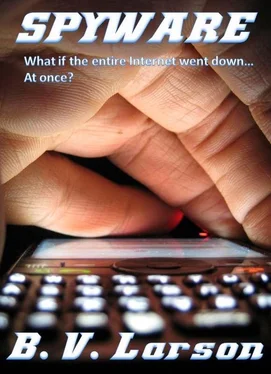B Larson - Spyware
Здесь есть возможность читать онлайн «B Larson - Spyware» весь текст электронной книги совершенно бесплатно (целиком полную версию без сокращений). В некоторых случаях можно слушать аудио, скачать через торрент в формате fb2 и присутствует краткое содержание. Жанр: Триллер, на английском языке. Описание произведения, (предисловие) а так же отзывы посетителей доступны на портале библиотеки ЛибКат.
- Название:Spyware
- Автор:
- Жанр:
- Год:неизвестен
- ISBN:нет данных
- Рейтинг книги:4 / 5. Голосов: 1
-
Избранное:Добавить в избранное
- Отзывы:
-
Ваша оценка:
- 80
- 1
- 2
- 3
- 4
- 5
Spyware: краткое содержание, описание и аннотация
Предлагаем к чтению аннотацию, описание, краткое содержание или предисловие (зависит от того, что написал сам автор книги «Spyware»). Если вы не нашли необходимую информацию о книге — напишите в комментариях, мы постараемся отыскать её.
The world believes Ray Vance released the worst computer virus in history. The virus adapts and evolves like a biological creature in order to survive. Many believe it is a new life form, but one designed with an evil purpose. As the sun sets on our technological world and the entire Internet shuts down, Vance runs from the feds. He must save his family, stop the virus… and stay alive.
Spyware — читать онлайн бесплатно полную книгу (весь текст) целиком
Ниже представлен текст книги, разбитый по страницам. Система сохранения места последней прочитанной страницы, позволяет с удобством читать онлайн бесплатно книгу «Spyware», без необходимости каждый раз заново искать на чём Вы остановились. Поставьте закладку, и сможете в любой момент перейти на страницу, на которой закончили чтение.
Интервал:
Закладка:
The class laughed aloud.
Ray nodded to them, “Yes, well… Now, that was it for the virus. That’s all it did. If you hit any key, the image was gone and you could go on with your work for the day. Many of us found it mildly amusing and harmless and generally not worth the trouble of hunting down and erasing the carefully hidden files. The virus would of course attempt to spread itself to other machines whenever possible, so that soon everyone in the office was enjoying “Big Blue” as it came to be known.
“After a few weeks, however, the humor wore thin. People gradually realized that they didn’t enjoy being flipped off by Big Blue every morning. It took us a few days to eradicate it from every disk we had, but we finally did it one weekend, with only a minimum of overtime and downtime.”
“Do you still have a copy of that one on disk, Dr. Vance?”
“Ah, no Magic, I’m sorry. As I was saying, there are a fair number of oddballs like that one. I recall another that caused my word processor program to only print in foreign character sets. Umlauts, accents and the like were rampant until you could get it cleaned off. About seventy-five percent of viruses are sales viruses or search engine hijackers. They perform mild trick like that. Unfortunately, some viruses aren’t harmless pranks. The second behavioral type, the data-destructive virus, is fairly common. Approximately twenty percent plus of viruses come under this category and amount to vandalism. In general, these viruses go for the most valued element of any computer system, the hard disk. They use many approaches, from the brute force of a low-level reformat to a subtle jumbling of the file allocation table, but the result is always the loss of hours upon hours of work. Often, this sort of thing does more damage to individuals rather than to companies, as companies tend to more carefully back-up their data.
“Last on the list is the rarest and perhaps most feared type: the hardware destructive virus. These are indeed rare, but do exist.”
“How can a program damage hardware?” asked Magic. Her question was very serious, but her eyes were still closed. Ray took this in stride, he was used to her by now and no longer found it disturbing to answer questions from a student who listened closely while she looked asleep. He suspected her mental circuitry operated differently than it did for most people. Many computer people, when tested by experts, had odd brain behavioral patterns.
“In most cases it can only be done by someone who has specialized knowledge of the hardware, such as the chip-burning virus that irreparably damaged the motherboards of personal computers by repeatedly sending a signal to them until some of the integrated circuits actually burned out. More recently, viruses have been reported that will destroy the hard disk physically by simply causing the read/write head to seek from one end of the platter to the other, banging it back and forth as fast as it will go until the actuator arm breaks.”
“Jeez,” muttered another student. Ray always forgot his name and thought of him as the “guy with the baseball cap in the front row”.
“Indeed,” said Ray. “Viruses can be nasty things.”
“But how do they spread?” asked Alicia.
“Ah! Now therein lies the true genius in any virus. Only part of the code of any virus is dedicated to ‘doing its thing’. The rest is dedicated to spreading itself, generally by copying a file from place to place at some point. There are many schemes here. Some viruses rely on an immediate and devastating effect, such as the moment you run the infected program, it erases your hard disk. The problem with this one, of course, is that the victim is far less likely to transmit the virus to someone else’s machine after such a gross and fatal attack. Much like an organic virus that kills its host too soon, the computer virus that attacks prematurely will not have much of a chance to spread before it is eradicated.
“In fact, most viruses wait for a specific condition to attack, often waiting for weeks or even months before striking. This gives them a lot of time to spread before the threat can be realized. One classic example of this is the Michelangelo virus that was programmed to strike on February 17th, Michelangelo’s birthday. This type of virus is called the ‘time bomb’.
“Another type, known as the Trojan horse, starts off attached to a program such as a shareware game that users might want to give to their friends. Hidden within the game file is the virus, which will wait to act until the game program is executed.
“Commonly known as the Logic Bomb, a third scheme one encounters is a virus that is looking for a certain, specific event to occur before it attacks. This virus is often used by people seeking revenge. For example, a logic bomb might go off and delete the hard drive of a network server when a certain employee record is marked: terminated. That way, the employee gets instant revenge on the company that fired him or her.”
“But wouldn’t that be too obvious?” asked Magic. “I mean, wouldn’t they know that the anti-social programmer that they just fired had done it?”
“Possibly, but that is a far cry from catching the responsible party. In truth, perpetrators of software vandalism are rarely penalized for their actions.”
“But why not, Dr. Vance?” demanded Alicia, scandalized.
Ray rubbed his chin for a few moments before answering. “Several reasons. Firstly, the people in the legal establishment don’t really understand computers yet. New technology tends to change everything it touches, sometimes in a bad way. We create whole new businesses, but we also create new methods of crime at the same time. A fiftyish judge or legislator has probably had little understanding of the latest tech. Secondly, computer crimes are all but invisible and somewhat nebulous.”
He produced a flashdrive and held it up for them to examine. “A chip like this may contain a million dollar piece of industrial espionage. It might contain a million credit card records with matching social security numbers. It might contain a federal report, not yet released to Wall Street. It might even contain a fortune 500 company budget, or a secret formula for the next kind of rocket fuel.
“Or, it might be completely blank. The point is that to a white-haired judge, it looks the same either way. If you go out and burn down a one hundred million dollar building, or blow up an airliner, or steal a nice car, they will throw the book at you. Because they can see the damage and clearly measure it in their minds. Since the crime is obvious, they will respond appropriately. But with information crimes, the very hidden and nebulous nature of it tends to mask the magnitude of the damage done.”
“How much time would someone do for getting caught with the source code to a data-destructive virus, Dr. Vance?” asked Magic. Her eyes were still closed.
“If it was released and spread nationwide?”
“Yes.”
“Most likely in the neighborhood of zero to six months, depending on a variety of factors.”
Magic nodded silently.
Alicia shook her head. “Wow. Crime of the century and no price to pay!”
Magic spoke again. This time she opened her eyes. “Dr. Vance, I feel compelled to ask a serious question at this point.”
“Yes, Magic?”
“Have you ever written a virus, sir?”
Ray hesitated for a moment. He felt his face redden, just a shade as a wave of heat rose up his neck. “Well, I just said that I used to teach this class with a virus-writing contest of sorts, so of course I-”
“I’m sorry sir, let me rephrase the question,” interrupted Magic. “Have you ever written and released a virus of your own design?”
Читать дальшеИнтервал:
Закладка:
Похожие книги на «Spyware»
Представляем Вашему вниманию похожие книги на «Spyware» списком для выбора. Мы отобрали схожую по названию и смыслу литературу в надежде предоставить читателям больше вариантов отыскать новые, интересные, ещё непрочитанные произведения.
Обсуждение, отзывы о книге «Spyware» и просто собственные мнения читателей. Оставьте ваши комментарии, напишите, что Вы думаете о произведении, его смысле или главных героях. Укажите что конкретно понравилось, а что нет, и почему Вы так считаете.












